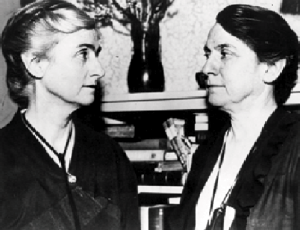Grace Abbott was born in Grand Island, Nebraska on November 17, 1878, to Othman Ali Abbott and Elizabeth Meleta Griffin Abbott, both of whom were raised as abolitionists, believing that slavery was a sin. She is the sister of Edith Abbott, who is also a well-known social reformer who worked hard protecting the rights of children. Her father was Nebraska’s first Lieutenant Governor.
Both sisters were influenced by their mother, an avid believer in equal rights for women.
Abbott attended the Grand Island Baptist College and the University of Nebraska, and went on to teach high school in Grand Island and in Broken Bow, Nebraska. In 1907, she left for Chicago, Illinois to continue her education at the University of Chicago where she received her master of philosophy degree.
Abbott began her social work career working with immigrants at the Hull House in Chicago, where she was a resident until 1917. For nine years, she worked as the director of the Immigrants Protective League, which was a program designed to help immigrants adjust to their new life, and protect them from mistreatment. During this time, Abbott became a trusted associate of Nobel Prize winner Jane Addams.
Abbott led fights against child labor from the coal mines of West Virginia to the factories of Massachusetts. She fought for the cause of infant and child health care in the slums of Chicago and the villages of the Appalachian Mountains. She is credited with saving thousands of children’s and immigrants’ lives and improving those of millions more.
Grace Abbott’s greatest contribution was in the area of social security legislation. Her book, Public Assistance – American Principles and Policies, was the result of many years of research and teaching. She once remarked that the two great events in her life were the constitutional amendment for universal suffrage, giving women the right to vote, and the passage of the Social Security Act.
At the time of Grace Abbott’s death, in 1939, First Lady Eleanor Roosevelt called her, “one of the great women of our day … a definite strength which we could count on for use in battle.” She was buried back in Nebraska alongside her sister, Edith Abbott. Abbott was also voted into the Nebraska Hall of Fame in 1976.



